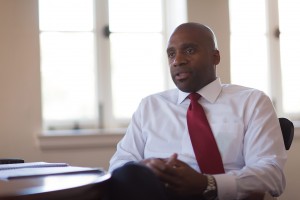New Vice Provost of Student Affairs eager to begin role
After 18 years under the control of Michael L. Jackson, the USC’s Student Affairs division has a new leader: Ainsley Carry.

New start · Ainsley Carry sits down with the Daily Trojan’s Annalise Mantz to discuss his new position as vice provost of Student Affairs. The semester is Carry’s first, both as Vice Provost and at USC. – Ralf Cheung | Daily Trojan
At USC, Carry steps into the brand-new role of vice provost for Student Affairs. Though his predecessor, Jackson, held the title of Vice President and reported to President C. L. Max Nikias, Carry will work directly with Provost Elizabeth Garrett.
Carry explained that his new title reflects a realignment in the priorities of Student Affairs. He said Garrett spearheaded a reorganization of the department to direct its focus to “a laser degree on student health, student safety and student engagement.”
The third of four brothers, Carry grew up in Miami. He earned a bachelor’s degree in food and resource economics, a master’s in counselor education and a doctorate in higher education at the University of Florida.
His career in higher education has included stints at Southern Methodist University, the University of Arkansas, Temple University and, most recently, Auburn University.
In the past, Student Affairs oversaw everything from on-campus dining and housing, to student engagement programs. The recent reorganization moved several departments, including orientation programs and university publications, out of Student Affairs.
“Those things were part of a portfolio that included a number of other things,” Carry said. “Now we’re saying, let’s drill down and focus on those things that are really most important to students.”
He explained that moving several offices out of Student Affairs’ jurisdiction shouldn’t reflect negatively on their importance.
“At the end of the day, I think the USC freshman, sophomore, graduate student isn’t sitting around saying, ‘that used to report to Student Affairs, but now it doesn’t so now I can’t use it anymore,’” he said. “That’s not their reality.”
The reality of attending USC, Carry said, is being a part of a hyper-involved and highly motivated student body. He said he hopes to meet as many students as he can and make himself as available as possible to the student body. He said students could connect with him on Twitter at @DrAinsleyCarry.
“To me, USC is like the best of all worlds — great athletics, great academics, the most diverse student environment, not to mention the city of Los Angeles,” he said. “I’ve worked at a number of schools, but the potential for world-changing opportunities? I’ve never seen it more expressed in a campus than here.”
Though Carry seemed excited to start the fall semester, he also expressed concerns about the allegations of sexual assault that led the U.S. Department of Education to launch an investigation of USC’s compliance with Title IX standards. He said he hoped to handle the situation by treating the students involved the way he would want his own six-year old daughter to be treated by her university when she attends college.
“The concerns that some students have expressed about our approach and response to claims of sexual assault are important to me, that we get to the truth, that we figure out a way to move forward,” Carry said. “And I know it’s important to the president and provost because these are people’s kids.”
He also saw USC’s relationship with the Los Angeles Police Department as a hot-button issue, in light of the incident last spring when more than 70 LAPD officers broke up a student party and arrested several students.
Carry said the protests that the USChangeMovement and other students organized in the wake of the incident made an important point, but the university needs to take stronger action.
“I get it,” he said of students’ anger over the incident. “But how do we facilitate an intelligent conversation in light of that context. It’s easy to protest and rally and get angry, but it’s harder to sit down and look at both sides of the story and ask how do we find a middle ground.”
Even as he acknowledged the potential difficulties the university will face handling these issues, Carry emphasized his excitement to work with students and faculty to better USC.
He cited the university’s focus on constant improvement as tremendous motivation. He said the fact that administrators want to improve USC’s graduation rate, already high at 90 percent, shows the university’s determination to keep improving.
“[USC focuses] not just on how can we be the best on the west coast or how can we be the best in the United States, but how can we be the best in the world. That’s exciting,” he said.
While Carry mentioned so many over arching goals for the university, he said he hasn’t lost sight of accomplishing a few of his own – including learning the fight song.
“I’m excited about learning USC traditions. I’m still waiting for somebody to teach me the fight song,” Carry said. “I know how to “Fight On” right now, but they haven’t taught me the fight song yet.”

Fight On!